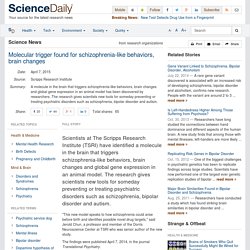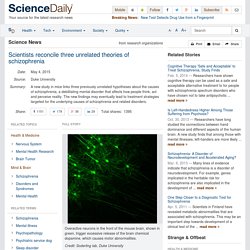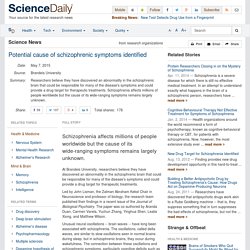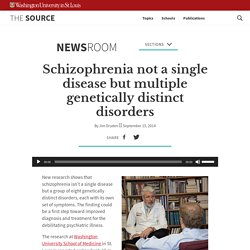

Molecular trigger found for schizophrenia-like behaviors, brain changes. Scientists at The Scripps Research Institute (TSRI) have identified a molecule in the brain that triggers schizophrenia-like behaviors, brain changes and global gene expression in an animal model.

The research gives scientists new tools for someday preventing or treating psychiatric disorders such as schizophrenia, bipolar disorder and autism. "This new model speaks to how schizophrenia could arise before birth and identifies possible novel drug targets," said Jerold Chun, a professor and member of the Dorris Neuroscience Center at TSRI who was senior author of the new study. The findings were published April 7, 2014, in the journal Translational Psychiatry.
What Causes Schizophrenia? According to the World Health Organization, more than 21 million people worldwide suffer from schizophrenia, a severe psychiatric disorder that can cause delusions and hallucinations and lead to increased risk of suicide. Mouse Models Show Symptoms This treatment prevented schizophrenia-like symptoms. Scientists reconcile three unrelated theories of schizophrenia.
A new Duke University study in mice links three previous and, until now, apparently unrelated hypotheses about the causes of schizophrenia, a debilitating mental disorder appearing in late adolescence that affects how people think, act and perceive reality.

The brains of people with the schizophrenia show various abnormalities, including faulty neural connections or an imbalance of certain brain chemicals. However, it has been unclear whether such brain-based observations could be related to one another or could describe different types of schizophrenia. Potential cause of schizophrenic symptoms identified. Schizophrenia affects millions of people worldwide but the cause of its wide-ranging symptoms remains largely unknown.

At Brandeis University, researchers believe they have discovered an abnormality in the schizophrenic brain that could be responsible for many of the disease's symptoms and could provide a drug target for therapeutic treatments. Led by John Lisman, the Zalman Abraham Kekst Chair in Neuroscience and professor of biology, the research team published their findings in a recent issue of the Journal of Biological Psychiatry. The paper was co-authored by Aranda Duan, Carmen Varela, Yuchun Zhang, Yinghua Shen, Lealia Xiong, and Matthew Wilson. Unusual neural oscillations -- brain waves -- have long been associated with schizophrenia. The oscillations, called delta waves, are similar to slow oscillations seen in normal brains during sleep, but in schizophrenic brains, they occur during wakefulness.
Delta waves require a specific type of ion channel called a T-type Ca channel. Early detection, intervention for schizophrenia: Progress report. Researchers are making progress toward developing effective approaches to early detection and intervention for psychosis -- with the goal of lessening the impact or even preventing the development of schizophrenia and other psychotic disorders.

Recent developments in early detection and intervention for psychosis are presented in the May special issue of The Journal of Nervous and Mental Disease, published by Wolters Kluwer. "There is now a consensus that if we can identify people early in the course of the illness, or even before the illness starts, there will be a better chance to improve outcomes," comments guest editor Faith Dickerson, PhD, MPH, of Sheppard Pratt Health System, Baltimore. Can Psychosis Be Detected and Treated Early?
"If we cannot cure schizophrenia, at least we can improve the quality of life and lower the rate of premature deaths," Dr. Dickerson adds. In the lead article, Patrick D. The special issue also includes an article by William T. Schizophrenia not a single disease but multiple genetically distinct disorders. New research shows that schizophrenia isn’t a single disease but a group of eight genetically distinct disorders, each with its own set of symptoms.

The finding could be a first step toward improved diagnosis and treatment for the debilitating psychiatric illness. The research at Washington University School of Medicine in St. Louis is reported online Sept. 15 in The American Journal of Psychiatry. About 80 percent of the risk for schizophrenia is known to be inherited, but scientists have struggled to identify specific genes for the condition. Now, in a novel approach analyzing genetic influences on more than 4,000 people with schizophrenia, the research team has identified distinct gene clusters that contribute to eight different classes of schizophrenia. “Genes don’t operate by themselves,” said C. Robert Boston.